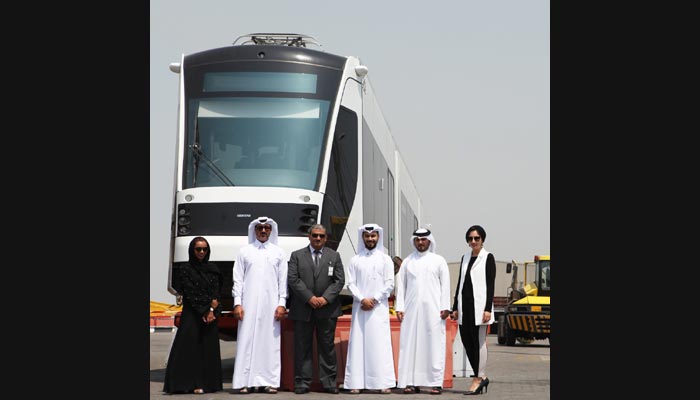Mohamed A. Aboughazala, executive director, QF Capital Projects; Ibrahim F. al-Haidos, senior MEP project engineer, QF Capital Projects; Mohamed I. al-Marzouqi, project manager, ASTAD Project Management and other team members at the arrival of the trams in Doha Port.
Qatar Foundation for Education, Science and Community Development (QF) is now one step closer to transforming its flagship development, Education City, into an environmentally-friendly ‘smart-city’ with the arrival in Doha of the first batch of trams for its ground-breaking QF Tram System.
QF’s ‘smart-city’, set to boast a car-free zone with reduced carbon emissions, is part of a wider, multifaceted plan to ensure that sustainability is an integral part of the day-to-day lives of local residents.
Siemens, the German-based company tasked with the project, is set to provide a total of 19 trams. With a capacity of 234 passengers per tram, including 60 seated, the system is set to transport an average of approximately 3,000 people in each direction every hour, with 17 trains operating, some at four-minute intervals during peak times.
Additionally, the trams will have a range of state-of-the art energy-saving features, including Siemens’ Sitras HES energy storage system. Enabling the trams to recharge at each station and operate without overhead power lines, the system will set a new benchmark for public transport infrastructure in the Middle East.
Once completed, the system will not only connect visitors, university students, and QF employees with 24 designated tram stations across 11.5km, it will also serve as a link to Qatar Rail’s leading development project, the Doha Metro.
The forward-thinking initiatives of QF also include encouraging the development of green infrastructure, promoting best practices for the design of buildings, harnessing energy through solar-panelled roofs and wind turbines, cutting C02 emissions, and utilising state-of-the-art monitoring measures, as well as urging residents to adopt healthy and active lifestyles.
“We have firmly placed sustainable development at the top of our agenda,” said Saad al-Muhannadi, president of Qatar Foundation. “QF’s dedication to sustainability is at the core of many our activities, and the tram system is just one example. We believe that the planning, design, and construction of green infrastructure is integral to the continued growth of our nation.
“We are delighted that the first shipment of trams has arrived. And with the trams having the potential to be one of the most energy-efficient forms of public transport, the ground-breaking system will fulfil our ultimate goal of transforming Education City into a ‘smart-city’, and becoming a benchmark for green development.
“We are proud to be working on this project with Qatar Foundation. The QF Tram System will be the most energy-efficient rail system in the Middle East, addressing not only the evolving requirements for transport solutions in Qatar, but also intentionally minimising the environmental impact,” said Fatih Sakiz, CEO, Siemens, Qatar.
Additionally, QF is set to open a comprehensive visitor’s centre, which will serve as a hub dedicated to the introduction of the brand-new QF Tram System to the public. The centre will feature a full-scale model of one of the trams, as well as information about the planned network.
While the QF Tram System will be the pivotal element in the creation of a ‘smart-city’, alongside the trams, QF has already successfully established a comprehensive e-Bike system, which not only reduces reliance on cars, but also encourages healthy lifestyles. Currently, there are 20 stations across the campus, and 200 bikes.

